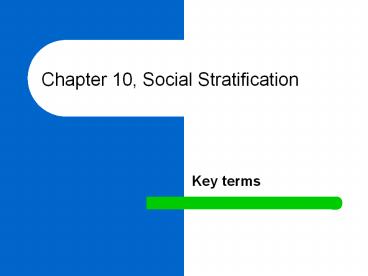Chapter 10, Social Stratification - PowerPoint PPT Presentation
Title:
Chapter 10, Social Stratification
Description:
Chapter 10, Social Stratification Key terms social differentiation The process by which different statuses in any group, organization or society develop. – PowerPoint PPT presentation
Number of Views:245
Avg rating:3.0/5.0
Title: Chapter 10, Social Stratification
1
Chapter 10, Social Stratification
- Key terms
2
- social differentiationThe process by which
different statuses in any group, organization or
society develop. - statuses Refers to a socially defined position
in a group or society.
3
- social stratificationThe fixed, hierarchical
arrangements of status differences by which
groups have different access to power, resources,
and perceived social worth. - estate systemsOwnership of property and exercise
of power is monopolized by an elite who have
total control over societal resources.
4
- caste systemRigid hierarchy of classes, often
preserved through formal law and cultural
practices that present free association and
movement between classes. - class systemStatus is partially achieved and
there is some potential for movement from one
class to another.
5
- social classThe social structural position a
group holds relative to the economic, social,
political, and cultural resources of society. - life chancesThe opportunities that people have
in common by virtue of belonging to a particular
class.
6
- means of productionSystem by which goods are
produced and distributed. - status attainmentThe process by which people
end up in a given position in the stratification
process.
7
- socioeconomic status (SES) Derived from income,
occupational prestige, and education. - median incomeMidpoint of all household incomes.
8
- occupational prestigeRefers to the subjective
evaluation people tie to jobs. - educational attainment.Total years of formal
education.
9
- wealthMonetary value of everything one owns.
- IncomeAmount of money brought into a household
from various sources.
10
- class consciousnessPerception that a class
structure exists and the feeling of shared
identification with others in one's class. - false consciousnessClass-consciousness of
subordinate classes who have internalized the
view of the dominant class.
11
- social mobilityA person's movement over time
from one class to another. - poverty lineThe amount of money needed to
support the basic needs of a household, as
determined by the government.
12
- feminization of povertyIncreasing proportion of
the poor who are women and children. - culture of poverty Contends that poverty is its
own cause.































